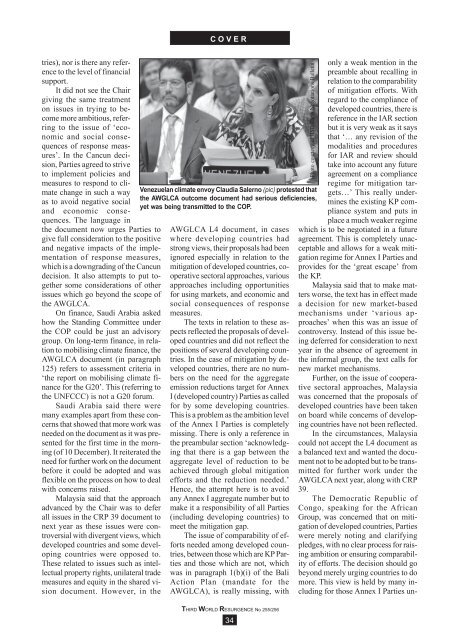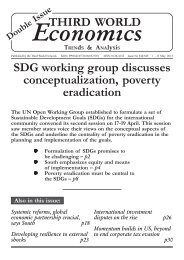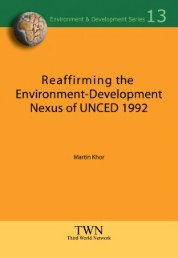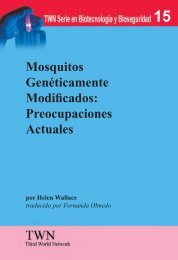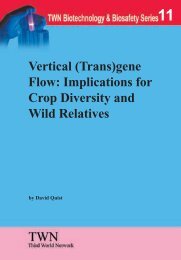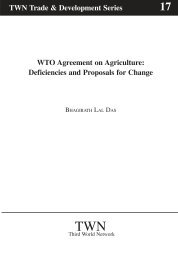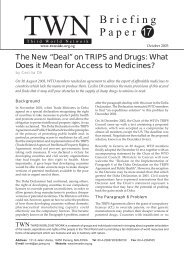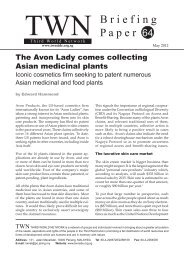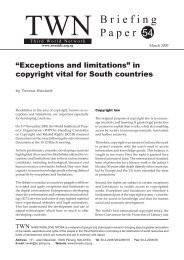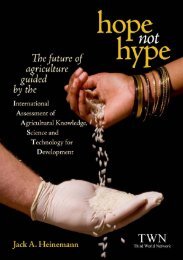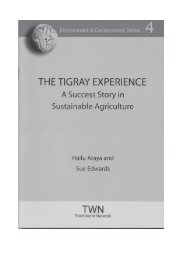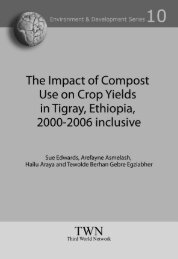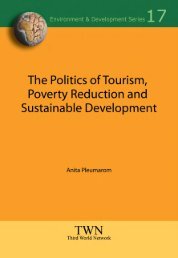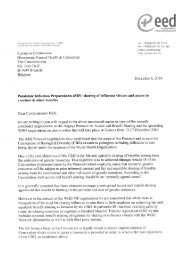Download - Third World Network
Download - Third World Network
Download - Third World Network
Create successful ePaper yourself
Turn your PDF publications into a flip-book with our unique Google optimized e-Paper software.
C O V E R<br />
tries), nor is there any reference<br />
to the level of financial<br />
support.<br />
It did not see the Chair<br />
giving the same treatment<br />
on issues in trying to become<br />
more ambitious, referring<br />
to the issue of ‘economic<br />
and social consequences<br />
of response measures’.<br />
In the Cancun decision,<br />
Parties agreed to strive<br />
to implement policies and<br />
measures to respond to climate<br />
change in such a way<br />
as to avoid negative social<br />
and economic consequences.<br />
The language in<br />
the document now urges Parties to<br />
give full consideration to the positive<br />
and negative impacts of the implementation<br />
of response measures,<br />
which is a downgrading of the Cancun<br />
decision. It also attempts to put together<br />
some considerations of other<br />
issues which go beyond the scope of<br />
the AWGLCA.<br />
On finance, Saudi Arabia asked<br />
how the Standing Committee under<br />
the COP could be just an advisory<br />
group. On long-term finance, in relation<br />
to mobilising climate finance, the<br />
AWGLCA document (in paragraph<br />
125) refers to assessment criteria in<br />
‘the report on mobilising climate finance<br />
for the G20’. This (referring to<br />
the UNFCCC) is not a G20 forum.<br />
Saudi Arabia said there were<br />
many examples apart from these concerns<br />
that showed that more work was<br />
needed on the document as it was presented<br />
for the first time in the morning<br />
(of 10 December). It reiterated the<br />
need for further work on the document<br />
before it could be adopted and was<br />
flexible on the process on how to deal<br />
with concerns raised.<br />
Malaysia said that the approach<br />
advanced by the Chair was to defer<br />
all issues in the CRP 39 document to<br />
next year as these issues were controversial<br />
with divergent views, which<br />
developed countries and some developing<br />
countries were opposed to.<br />
These related to issues such as intellectual<br />
property rights, unilateral trade<br />
measures and equity in the shared vision<br />
document. However, in the<br />
Venezuelan climate envoy Claudia Salerno (pic) protested that<br />
the AWGLCA outcome document had serious deficiencies,<br />
yet was being transmitted to the COP.<br />
AWGLCA L4 document, in cases<br />
where developing countries had<br />
strong views, their proposals had been<br />
ignored especially in relation to the<br />
mitigation of developed countries, cooperative<br />
sectoral approaches, various<br />
approaches including opportunities<br />
for using markets, and economic and<br />
social consequences of response<br />
measures.<br />
The texts in relation to these aspects<br />
reflected the proposals of developed<br />
countries and did not reflect the<br />
positions of several developing countries.<br />
In the case of mitigation by developed<br />
countries, there are no numbers<br />
on the need for the aggregate<br />
emission reductions target for Annex<br />
I (developed country) Parties as called<br />
for by some developing countries.<br />
This is a problem as the ambition level<br />
of the Annex I Parties is completely<br />
missing. There is only a reference in<br />
the preambular section ‘acknowledging<br />
that there is a gap between the<br />
aggregate level of reduction to be<br />
achieved through global mitigation<br />
efforts and the reduction needed.’<br />
Hence, the attempt here is to avoid<br />
any Annex I aggregate number but to<br />
make it a responsibility of all Parties<br />
(including developing countries) to<br />
meet the mitigation gap.<br />
The issue of comparability of efforts<br />
needed among developed countries,<br />
between those which are KP Parties<br />
and those which are not, which<br />
was in paragraph 1(b)(i) of the Bali<br />
Action Plan (mandate for the<br />
AWGLCA), is really missing, with<br />
Photo courtesy of IISD/Earth Negotiations Bulletin<br />
only a weak mention in the<br />
preamble about recalling in<br />
relation to the comparability<br />
of mitigation efforts. With<br />
regard to the compliance of<br />
developed countries, there is<br />
reference in the IAR section<br />
but it is very weak as it says<br />
that ‘… any revision of the<br />
modalities and procedures<br />
for IAR and review should<br />
take into account any future<br />
agreement on a compliance<br />
regime for mitigation targets…’<br />
This really undermines<br />
the existing KP compliance<br />
system and puts in<br />
place a much weaker regime<br />
which is to be negotiated in a future<br />
agreement. This is completely unacceptable<br />
and allows for a weak mitigation<br />
regime for Annex I Parties and<br />
provides for the ‘great escape’ from<br />
the KP.<br />
Malaysia said that to make matters<br />
worse, the text has in effect made<br />
a decision for new market-based<br />
mechanisms under ‘various approaches’<br />
when this was an issue of<br />
controversy. Instead of this issue being<br />
deferred for consideration to next<br />
year in the absence of agreement in<br />
the informal group, the text calls for<br />
new market mechanisms.<br />
Further, on the issue of cooperative<br />
sectoral approaches, Malaysia<br />
was concerned that the proposals of<br />
developed countries have been taken<br />
on board while concerns of developing<br />
countries have not been reflected.<br />
In the circumstances, Malaysia<br />
could not accept the L4 document as<br />
a balanced text and wanted the document<br />
not to be adopted but to be transmitted<br />
for further work under the<br />
AWGLCA next year, along with CRP<br />
39.<br />
The Democratic Republic of<br />
Congo, speaking for the African<br />
Group, was concerned that on mitigation<br />
of developed countries, Parties<br />
were merely noting and clarifying<br />
pledges, with no clear process for raising<br />
ambition or ensuring comparability<br />
of efforts. The decision should go<br />
beyond merely urging countries to do<br />
more. This view is held by many including<br />
for those Annex I Parties un-<br />
THIRD WORLD RESURGENCE No 255/256<br />
34


